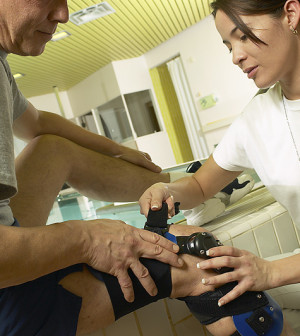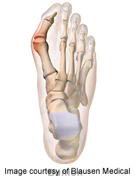- Could Your Grocery Store Meat Be Causing Recurring UTIs?
- Are You Making This Expensive Thermostat Error This Winter?
- Recognizing the Signs of Hypothyroidism
- 10 Strategies to Overcome Insomnia
- Could Artificial Sweeteners Be Aging the Brain Faster?
- Techniques for Soothing Your Nervous System
- Does the Water in Your House Smell Funny? Here’s Why
- Can a Daily Dose of Apple Cider Vinegar Actually Aid Weight Loss?
- 6 Health Beverages That Can Actually Spike Your Blood Sugar
- Treatment Options for Social Anxiety Disorder
Take Steps to Control Bunions


If you have bunions, taking care of them now can help you avoid more serious treatment later, an expert says.
A bunion is a bump that forms on the joint of the big toe when bone or tissue moves out of place and extends beyond the normal anatomy of the toe. Left untreated, bunions can cause debilitating pain and may require surgery to correct, said Brent Rosenthal, a podiatrist and podiatric surgeon at CentraState Medical Center in Freehold, N.J.
To prevent bunions, avoid wearing shoes with pointed triangular tips and don’t wear high heels for long periods of time each day, Rosenthal said. You should know your correct shoe size, which can increase with age, weight gain and pregnancy, he added.
If you do develop a bunion, start wearing shoes with a wide and deep toe box. Shoe inserts may reduce symptoms and prevent the bunion from getting worse, according to Rosenthal.
He also suggested using over-the-counter, non-medicated bunion pads whenever you wear shoes. If the bunion is inflamed and sore, apply ice packs several times a day, he said.
If these initial treatments don’t help, see a podiatrist, a doctor who specializes in conditions of the feet and ankle. The doctor might prescribe an anti-inflammatory drug and/or cortisone injection to ease pain and inflammation. Ultrasound therapy is widely used to treat bunion-related soft tissue damage.
If these therapies fail, surgery may be required to relieve pressure and repair the toe joint, said Rosenthal, who noted that recovery from the surgery takes time and discomfort can last weeks.
More information
The U.S. National Library of Medicine has more about bunions.
Source: HealthDay
Copyright © 2026 HealthDay. All rights reserved.










